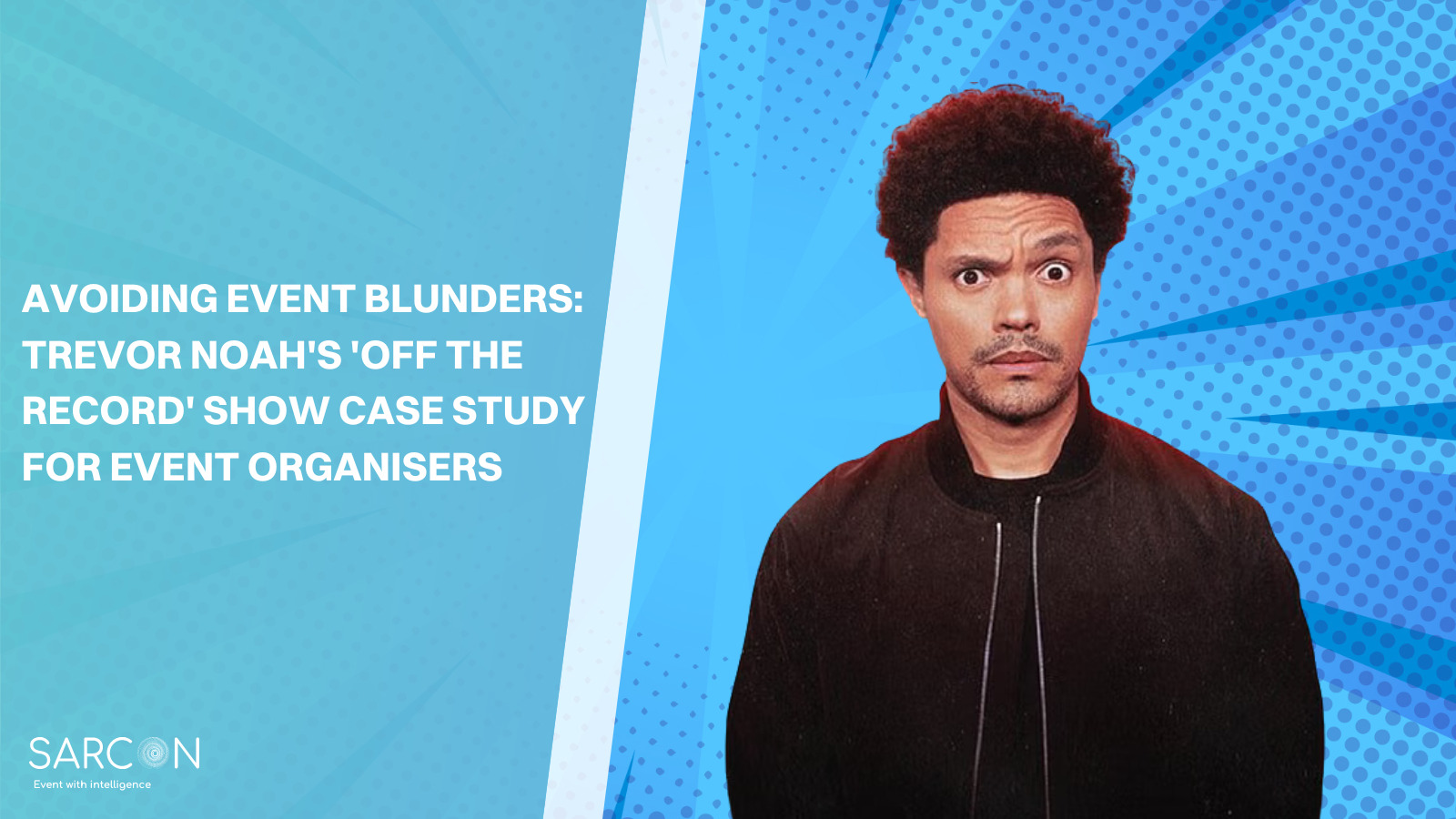The Trevor Noah Show in Bangalore was poised to be an unforgettable night of laughter, but it quickly turned into a comedy of errors, highlighting some of the challenges of hosting large-scale live events. In addition to the specific issues faced during the Trevor Noah Show, there are broader challenges that impact the successful execution of such large-scale events like the chaos that engulfed AR Rahman’s performance in Chennai. These occurrences have brought to the forefront the pressing issues that plague large-scale live shows, transcending geographical boundaries.
In this blog, we will delve into the debacle of Trevor Noah’s ‘Off The Record’ show, exploring the specific challenges faced and their broader implications. Let’s peel back the layers of misadventure, shed light on the complexities of event organisation, and examine how event organisers can learn from these experiences to ensure a seamless and unforgettable live event for their audience.
What Went Wrong at Trevor Noah’s “Off the Record Show”
-
Venue Limitations :
One major challenge often plaguing large-scale events is the scarcity of venues capable of effectively handling all aspects of event management, including backstage logistics and crowd control. Many venues tend to prioritise VIP and premium ticket sections while neglecting those with lower-priced tickets. The auditorium at Trevor’s show was unfavourably compared to an Amazon warehouse, which fell short of meeting audience expectations for a high-profile comedy show. Furthermore, the auditorium’s screens were inadequate in size, making it difficult for attendees seated at the back to enjoy a clear view of the performance. Insufficient amenities, including parking in a slushy area, subpar restroom facilities, and cold food at the stalls, immediately impacted attendees’ comfort and overall experience.
what is this garbage flat venue for @Trevornoah show in Bengaluru @bookmyshow? For tickets that are this much pricey can’t we expect category 7 and onwards seats to even get to see the stage? any chance you’ll revise this? Not even an auditorium where the back seats are elevated pic.twitter.com/j2OMObB0J9
— Hrishikesh Kayshap (@_Hrishikesh_K) August 1, 2023
-
Mismanagement:
Lack of preparation and mismanagement in logistics and security often arise as significant concerns at large events and the same was noticeable at the show. Issues such as inadequate barricading, understaffed security teams, exit mismanagement, traffic congestion, ambulance accessibility, and fire brigade readiness can seriously undermine the event experience.
-
Slow Check-in System:
While the organizers had a check-in system in place, it operated at a sluggish pace and suffered from a lack of mobile data access, resulting in the absence of internet connectivity and QR codes. The lengthy waiting lines, stretching over several hours, tested the patience of the crowd and led to unruly behavior, creating a challenging environment for both event staff and attendees.
-
Overselling Tickets:
The issue of overselling tickets was not unique to Trevor Noah’s show. Earlier, AR Rahman’s concert in Chennai faced criticism for the same problem, leading to overcrowding and inadequate crowd management. Additionally, a surge of people without tickets showed up at the venue, hoping to purchase on-site, overwhelming the staff.
-
Sound and Light Problems :
People in certain rows couldn’t hear the comedian. This could have been avoided with thorough pre-event testing and following best practices.
Dear Bengalaru India, I was so looking forward to performing in your amazing city but due to technical issues we’ve been forced to cancel both shows.
We tried everything but because the audience can’t hear the comedians on stage there’s literally no way to do a show. We’ll make…— Trevor Noah (@Trevornoah) September 27, 2023
-
Food and Beverage Fiasco
Purchasing food and beverages became a herculean task, especially with a spotty internet connection and non-functioning payment mechanisms.
Addressing the Issues
So, how can these issues be addressed and minimised to ensure a smoother and safer experience for event attendees?
-
Venue Selection:
Event organizers should prioritize understanding the specific needs of artists and carefully assess ticket sales and audience demographics to choose suitable venues that offer adequate security and facilities. Clearly marked exits and access to medical services are crucial components of venue selection. For more info read :Why Event Planners Should Consider Event Management Platform with Venue Diagramming Feature
-
Staff Training to handle mismanagement:
Effective training for event staff is of paramount importance. Event management companies should employ experienced individuals for critical roles, particularly in crowd management, rather than relying on inexperienced personnel.
-
Audience Safety:
Organisers must prioritise the emotional and physical safety of the audience from the planning stage onwards. Strict adherence to safety protocols, traffic handling, and crowd management can help prevent issues.
-
Low Connectivity and Slow Check-in System:
Inadequate internet connectivity can hamper the smooth operation of various event processes, including check-in procedures and the use of mobile apps for services. This issue can lead to long queues and delays, as seen at the Trevor Noah Show. Event organisers should use a check-in system that offers offline capabilities and works even in unstable network conditions, ensuring quick, reliable scans even in suboptimal lighting. Train your team extensively and conduct trial runs prior to the event.
-
Duplicate Tickets:
The presence of duplicate tickets can exacerbate confusion and delays. Organisers should implement measures to flag duplicates, such as using advanced ticketing technology like barcode or QR code scanners to validate tickets at entry, ensuring each ticket has a unique code that’s invalidated upon entry to prevent reuse.
-
- Enhanced Mobile Ticketing:
Mobile tickets, accessible through official apps, are more secure and harder to counterfeit, providing real-time validation and updates. They contain dynamic security elements that make them nearly impossible to counterfeit. Encouraging attendees to use mobile tickets and ensuring your ticketing partner offers a robust event app can enhance security.
-
- Personalised Security:
Organisers can opt for a ticketing system that allows the ticket buyer’s photo to be added to the ticket, adding an extra layer of security. This makes it even more challenging for counterfeit tickets to be used, ensuring that only the rightful ticket holder gains entry.
-
Onsite ticket purchase :
Event organisers should clearly communicate ticket policies across all platforms and onsite. Have a separate, well-trained team and a strong security presence to manage unregistered attendees.
-
Sound and Light Problems:
Technical issues, such as sound and lighting problems that affect the audience’s experience, can be avoided through thorough pre-event testing and adherence to best practices in audio-visual setup.
-
Food and Beverage Services:
Inconsistent access to food and beverages due to spotty internet connections can be resolved by implementing an in-app credit system that allows attendees to preload funds for seamless, cashless payments during the event.
-
Insufficient Parking Space:
The lack of adequate parking space can lead to significant inconveniences. Organisers should select venues based on the event’s expected size and provide clear information to attendees regarding parking limitations. They should also suggest alternative transportation options, such as public transport, to minimise the impact on traffic congestion and parking shortages.
In conclusion, while incidents like the one at Trevor Noah’s “Off the Record Show” and the AR Rahman concert in Chennai are exceptions, they underscore the need for better event management in India. By addressing venue limitations, mismanagement, and audience behaviour, India can continue to be a thriving hub for large-scale live events. With a renewed commitment to professionalism and safety, both organisers and artists can ensure that attendees leave with positive memories and a desire to attend future events. It is crucial that organisers prioritise understanding artists’ needs, enhance staff training, and prioritise the safety and well-being of the audience from the event’s planning stage onwards. Moreover, stricter standards and permissions are expected to be put in place for future events, promoting a safer and more enjoyable experience for all.



